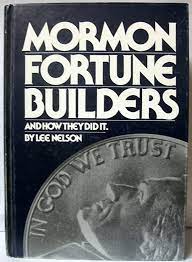Articles/Essays – Volume 16, No. 4
The Gospel of Greed | Lee Nelson, Mormon Fortune Builders and How They Did It
Sometimes I wonder why it is that our Mormon society, particularly those of us living in Utah, are so eager to become rich and successful (that is, if wealth really brings success). As a financial consultant to clients throughout the western states I am amazed at the naivete with which many would-be Mormon millionaires set out with their positive mental attitudes to find their rainbow of wealth.
While wealth in and of itself is not necessarily a bad thing, many of us try to get something for nothing. Utah is un fortunately known as one of the fraud capitals of the English-speaking world. We tend to hope that pyramid schemes and Ponzi maneuvers are legitimate vehicles on the road of financial independence.
What does this have to do with the book Mormon Fortune Builders and How They Did It? Maybe not too much if all you read are the biographies themselves. I am not critical of the eleven individuals themselves or the success which they have enjoyed thus far in their financial careers. I am curious, however, about what criteria was used in selecting these eleven as Mormonism’s representatives of personal fortune and wealth. It would also appear that this wealth representation is heavily centered in Utah and excludes Mormons of more prominent stature and public awareness living outside the state.
My main criticism of the book is that it tries to create a spiritual/scriptural formula for becoming wealthy. The author relates a personal spiritual experience which occurred in 1974 which inspired him about how “the Lord gives the power to get the wealth.” The formula as related by the author parallels the four first principles of the gospel. First, one must have faith in oneself. Second, one has to repent, but in the author’s words, “Repentence was nothing more than a church word meaning to change, to learn, to adjust.” Third, one needs to have the ability to make decisions and remain committed, much as a new convert enters into covenants at baptism. Fourth, one must follow the promptings, feelings of well-being, and hunches inspired by the Holy Ghost. To me, the author is providing a formula for entrepreneurial achievements, not a guarantee of financial success. He fails to remember such ideas as proper education, financial budgeting, and hard work, to mention just a few important characteristics in becoming financially successful.
As a young man I received my Sunday School training during my high school years from Grant Affleck, now famous for the financial downfall of his company, AFCO Enterprises. Hundreds and possibly thou sands of individuals and companies have lost millions just because they tried to squeeze too much juice out of an orange. As a bishop in Centerville I saw many families hurt financially when they became involved in a pyramid scheme using over-valued diamonds. As a financial planner and consul tant, I see dozens of shaky investments fly through the valley with the hope of convincing gullible Mormons and others to invest.
All of this is to say that I am afraid of books which foster an inappropriate entrepreneurial spirit. I grew up with a father who is an entrepreneur, but it meant eighty to-ninety-hour work weeks and plenty of hard work every day. While it is interesting to read of the lives of some of the individuals mentioned in the book, I believe Nelson may possibly have had among his motives as an author the goal of trying to cash in on the Mormon market by writing a book aimed at our fellow brothers and sisters who enjoy chasing rainbows in their pastime. I question whether God really gave us the power to become wealthy as though it were some type of destiny for us to fulfill. It would be interesting to return in five years and see if all eleven individuals mentioned still have their fortunes.
Mormon Fortune Builders and How They Did It by Lee Nelson (Provo, Utah: Council Press, 1981), 252 pp., $10.95.


 Back to full Issue
Back to full Issue

